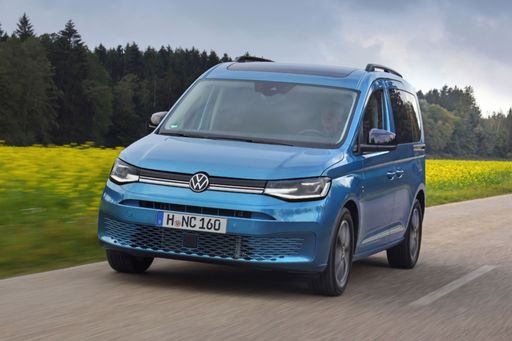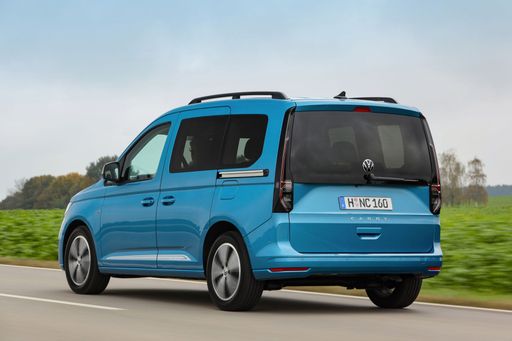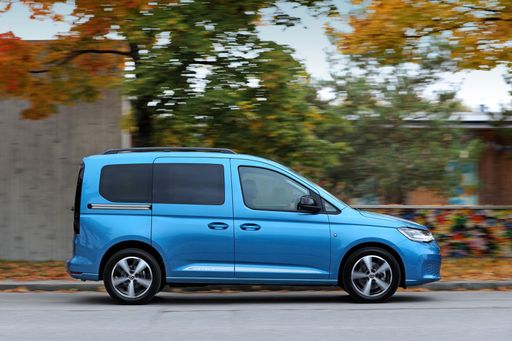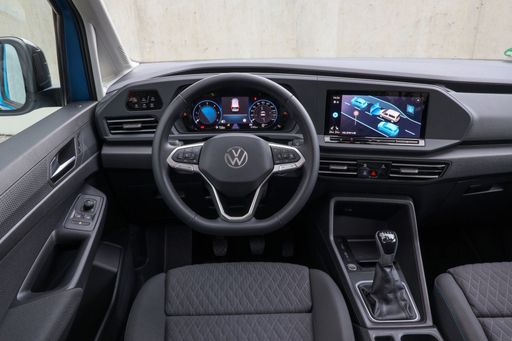Nissan Leaf VS VW Caddy – Specs, Efficiency & Price Comparison
Find out now which car fits your needs better!
The Nissan Leaf (Hatchback) is powered by a Electric engine and comes with a Automatic transmission. In comparison, the VW Caddy (High Roof Estate) features a Petrol, Diesel or Plugin Hybrid engine and a Manuel or Automatic gearbox.
When it comes to boot capacity, the Nissan Leaf offers 394 L, while the VW Caddy provides – depending on what matters most to you. If you’re looking for more power, you’ll need to decide whether the 217 HP of the Nissan Leaf or the 150 HP of the VW Caddy suits your needs better.
There are also differences in efficiency: 16.70 kWh vs 0.50 L. In terms of price, the Nissan Leaf starts at 30800 £, while the VW Caddy is available from 27800 £.
Compare all the key specs now and find out which model fits your lifestyle best!
Nissan Leaf
The Nissan Leaf stands out as a pioneering model in the realm of electric vehicles, known for its impressive blend of practicality and eco-friendliness. It offers a smooth and quiet driving experience, making it an ideal choice for city commuting and longer journeys alike. The interior design is both comfortable and intuitive, providing drivers with a sense of modernity and ease of use.
details @ germany.nissannews.com
@ germany.nissannews.com
 @ germany.nissannews.com
@ germany.nissannews.com
 @ germany.nissannews.com
@ germany.nissannews.com
 @ germany.nissannews.com
@ germany.nissannews.com
VW Caddy
The VW Nutzfahrzeuge Caddy Hochdach-Kombi is a versatile choice for those seeking extra space and practicality in their everyday vehicle. With its functional high roof and adaptable interior, it easily accommodates both passengers and cargo. The Caddy also stands out with its modern design and features aimed at providing comfort and convenience on the road.
details @ vwpress
@ vwpress
 @ vwpress
@ vwpress
 @ vwpress
@ vwpress
 @ vwpress
@ vwpress

|

|
|
|
|
Costs and Consumption |
|
|---|---|
|
Price
30800 - 37200 £
|
Price
27800 - 45900 £
|
|
Consumption L/100km
-
|
Consumption L/100km
0.5 - 6.9 L
|
|
Consumption kWh/100km
16.7 - 17.8 kWh
|
Consumption kWh/100km
-
|
|
Electric Range
270 - 385 km
|
Electric Range
116 - 121 km
|
|
Battery Capacity
39 - 59 kWh
|
Battery Capacity
19.70 kWh
|
|
co2
0 g/km
|
co2
10 - 165 g/km
|
|
Fuel tank capacity
-
|
Fuel tank capacity
50 L
|
Dimensions and Body |
|
|---|---|
|
Body Type
Hatchback
|
Body Type
High Roof Estate
|
|
Seats
5
|
Seats
5 - 7
|
|
Doors
5
|
Doors
5
|
|
Curb weight
1580 - 1756 kg
|
Curb weight
1575 - 1998 kg
|
|
Trunk capacity
385 - 394 L
|
Trunk capacity
-
|
|
Length
4490 mm
|
Length
4500 - 4853 mm
|
|
Width
1788 mm
|
Width
1855 mm
|
|
Height
1540 - 1545 mm
|
Height
1819 - 1860 mm
|
|
Payload
384 - 415 kg
|
Payload
501 - 710 kg
|
Engine and Performance |
|
|---|---|
|
Engine Type
Electric
|
Engine Type
Petrol, Diesel, Plugin Hybrid
|
|
Transmission
Automatic
|
Transmission
Manuel, Automatic
|
|
Transmission Detail
Reduction Gearbox
|
Transmission Detail
Manual Gearbox, Dual-Clutch Automatic
|
|
Drive Type
Front-Wheel Drive
|
Drive Type
Front-Wheel Drive, All-Wheel Drive
|
|
Power HP
150 - 217 HP
|
Power HP
102 - 150 HP
|
|
Acceleration 0-100km/h
6.9 - 7.9 s
|
Acceleration 0-100km/h
11.4 - 14 s
|
|
Max Speed
144 - 157 km/h
|
Max Speed
173 - 186 km/h
|
|
Torque
320 - 340 Nm
|
Torque
220 - 320 Nm
|
|
Number of Cylinders
-
|
Number of Cylinders
4
|
|
Power kW
110 - 160 kW
|
Power kW
75 - 110 kW
|
|
Engine capacity
-
|
Engine capacity
1498 - 1968 cm3
|
General |
|
|---|---|
|
Model Year
2019
|
Model Year
2024
|
|
CO2 Efficiency Class
A
|
CO2 Efficiency Class
E, F, B
|
|
Brand
Nissan
|
Brand
VW
|
Nissan Leaf
Introduction to the Nissan Leaf: A Pioneer in Electric Mobility
The Nissan Leaf has established itself as a trailblazer in the realm of electric vehicles (EVs) since its launch. As we delve into its present-day iterations, the Leaf continues to soar in popularity due to remarkable advancements in technology and sustainability. Let's explore what makes the Nissan Leaf a standout in today's automotive market.
Power and Performance: Under the Hood of the Nissan Leaf
The Nissan Leaf boasts a power output ranging from 150 to 217 PS, depending on the battery option chosen. The vehicle's electric motor, a product of cutting-edge engineering, offers instant torque ranging from 320 to 340 Nm, resulting in impressive acceleration capabilities. The 0 to 100 km/h dash is achieved in as little as 6.9 seconds, showcasing its prowess in electric performance.
Battery Technology: Efficient Energy Management
When discussing the Nissan Leaf, battery technology is at the forefront. The available battery capacities range from 39 to 59 kWh, supporting an electric range between 270 to 385 km. This flexibility allows drivers to choose a model that best fits their driving habits, providing peace of mind for longer journeys without frequent recharging.
Sustainability: The Environmental Edge
One of the primary attractions of the Nissan Leaf is its commitment to sustainability. As an all-electric vehicle, it produces zero CO2 emissions, placing it in the top tier of the CO2-efficiency class with an 'A' rating. This clean energy approach contributes significantly to reducing environmental impact and supports Nissan's drive towards a greener future.
Design and Comfort: Aesthetic Appeal and Practicality
The Nissan Leaf is not just about efficiency; it's also designed for comfort and utility. With its sleek hatchback body and dimensions of 4490 mm in length, 1788 mm in width, and a height of up to 1545 mm, it offers ample interior space. The boot capacity ranges from 385 to 394 litres, providing sufficient storage for everyday needs. The model accommodates five passengers comfortably, ensuring a pleasant ride for everyone.
Innovations and Safety: Advanced Features for Peace of Mind
Nissan equips the Leaf with an array of intelligent features that enhance safety and convenience. The available equipment lines, including N-CONNECTA, Tekna, e+ N-CONNECTA, and e+ Tekna, offer varying levels of technology integration. ProPILOT Assist, e-Pedal, and a comprehensive suite of driver-assistance technology are just a few examples that highlight Nissan's commitment to innovation in the EV market.
Conclusion: The Nissan Leaf Continues to Lead
With prices ranging from €35,900 to €43,400, the Nissan Leaf remains an attractive choice for those looking to embrace electric mobility. It perfectly balances performance, design, and sustainability, making it a compelling choice in the competitive EV landscape. The Nissan Leaf not only represents the future of driving but also reinforces why it continues to be a leader in the electric vehicle community.
VW Caddy
A Versatile Classic Reimagined: The Volkswagen Caddy
The Volkswagen Caddy has long been celebrated as a versatile workhorse, adeptly bridging the gap between utility and comfort. With its roots tracing back to the 1980s, the Caddy has evolved considerably, transforming from a humble commercial vehicle to a sophisticated multi-purpose van. The latest model continues this tradition by offering innovative features and enhanced technical specifications, reaffirming its status as an indispensable vehicle for both professional and personal use.
Efficient Engines and Environmental Innovation
At the heart of the Volkswagen Caddy lies an array of engines designed to balance performance with efficiency. The latest generation offers a selection of TSI petrol and TDI diesel engines, each engineered to meet the strictest environmental standards. These Euro 6 compliant engines not only reduce emissions but also ensure optimal fuel efficiency, making the Caddy an economically viable choice for businesses and environmentally conscious drivers alike.
For those seeking an even greener option, Volkswagen offers a natural gas engine variant. This innovative powertrain reduces CO2 emissions significantly, yet delivers a driving experience that remains characteristically smooth and powerful. This commitment to alternative energy sources reflects Volkswagen's dedication to sustainability and forward-thinking automotive design.
Advanced Connectivity and Safety Features
The Volkswagen Caddy is not just about robust performance; it also shines in the realm of technology and safety. The modern dashboard is equipped with the Discover Media navigation system, integrating satellite navigation with real-time traffic updates. This intuitive infotainment system gets wirelessly connected to smartphones via Apple CarPlay and Android Auto, keeping drivers informed and entertained during every journey.
Safety is paramount in the latest Caddy, which comes standard with a suite of advanced driver assistance systems. Front Assist with City Emergency Braking ensures crucial safety in urban environments, while Adaptive Cruise Control with speed limiter provides comfort and control on the open road. Additionally, features like the Park Assist system make maneuvering in tight spaces a breeze, offering peace of mind and ease of use no matter the driving conditions.
Dynamic Design and Practicality
Blending aesthetics with functionality, the redesigned exterior of the Volkswagen Caddy is both modern and practical. It features a streamlined silhouette that not only improves aerodynamic efficiency but also enhances its visual appeal. From the distinctive front grille to the LED headlamps, every design element serves a purpose, resonating Volkswagen’s design philosophy of form following function.
Inside, the Caddy offers a remarkably spacious interior, adaptable to a variety of needs. Depending on the configuration, it accommodates up to seven passengers comfortably or can be transformed to offer substantial cargo space, catering to professionals who require versatility from their vehicles. The interior details are thoughtfully crafted, with high-quality materials that sustain durability and comfort over long-term use.
Conclusion: A Modern Mainstay
The Volkswagen Caddy, with its latest iteration, continues to embody versatility and innovation. Its efficient powertrains, cutting-edge connectivity features, and commitment to safety set new standards in the compact van segment. Whether utilized as a family vehicle or a business asset, the Caddy remains a formidable choice, carrying forward a legacy of reliability and ingenuity.
For drivers seeking a well-rounded vehicle that offers the best of both worlds—commercial reliability with personal comfort—the Volkswagen Caddy stands as an exemplary choice. It is not just a vehicle; it's a partner on wheels, designed for the multifaceted demands of modern life.
The prices and data displayed are estimates based on German list prices and may vary by country. This information is not legally binding.
